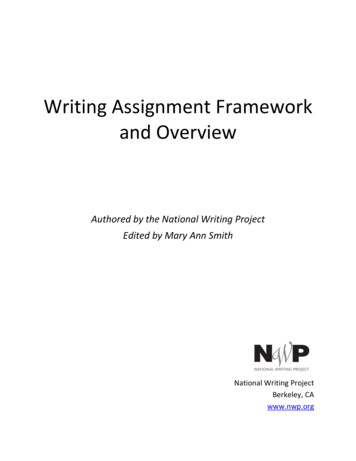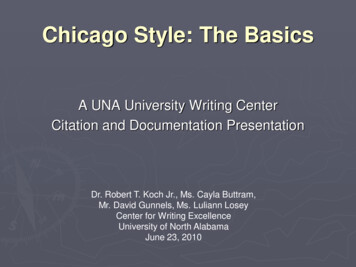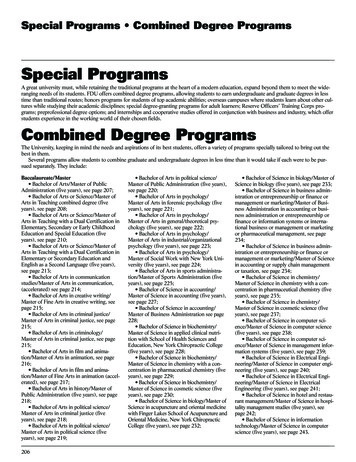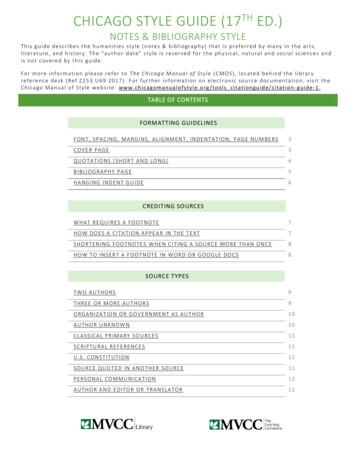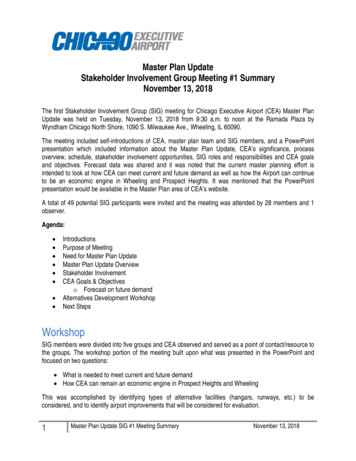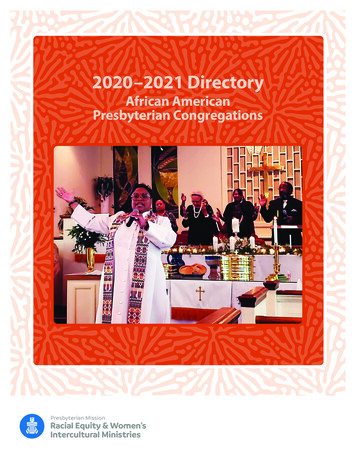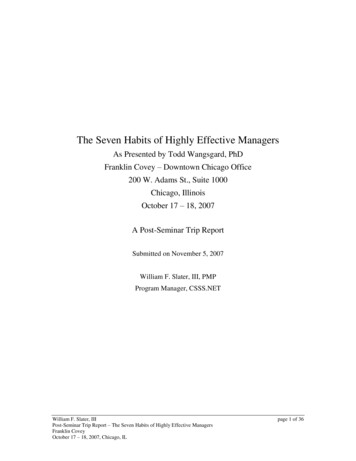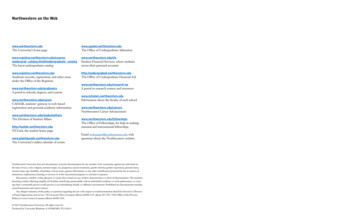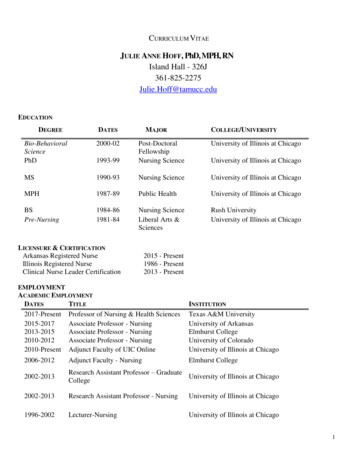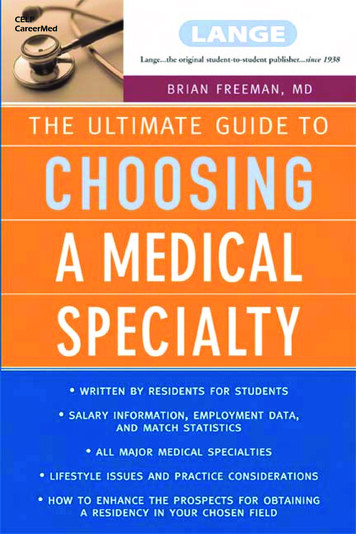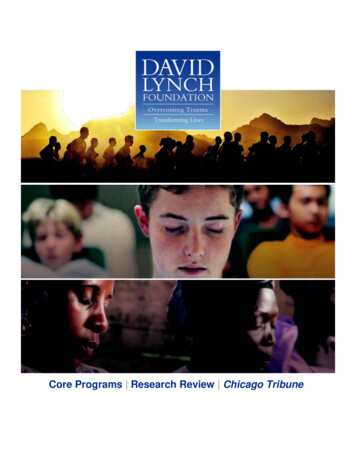
Transcription
Core Programs Research Review Chicago Tribune
ABOUT THE DAVID LYNCH FOUNDATIONThe David Lynch Foundation (DLF) is a 501(c)(3) nonprofit organization, founded in 2005, with a mission toreduce the epidemic of trauma and toxic stress among at-risk populations through the implementation of theevidence-based Transcendental Meditation technique. DLF has served more than 500,000 children and adultsworldwide, with a focus on underserved middle and high school students, veterans suffering from posttraumatic stress and their families, and women and children dealing with domestic violence and sexual assault.DLF also works with the homeless, prison populations, people living with HIV/AIDS, and others.QUIET TIMEWHAT IS TRANSCENDENTAL MEDITATION?Transcendental Meditation (TM) is a simple, easily-learned, evidence-based technique, practiced for 20minutes twice a day, sitting comfortably in a chair. During TM, the body gains a profound state of rest andrelaxation while the mind is deeply settled yet wide awake and the brain functions with increasedcoherence. More than 350 peer-reviewed studies verify the physiological and psychological benefits ofTranscendental Meditation for reducing stress and stress-related disorders, including hypertension,anxiety, depression, and insomnia, while increasing creativity, energy, intelligence, and focus.CORE PROGRAMSFor neighborhoods,schools in low-income, often crime-riddentraumatic stress is a daily reality formillions of children growing up in an oppressiveclimate of poverty, violence, and fear. This stress impedeslearning and undermines physical and mental health. 25% of teenagers suffer from anxiety disorders. Suicide is the third leading cause of deathamong teenagers.DLF’s Quiet Time program serves thousands of students inunderserved communities, fostering and sustaining positivelearning environments. Built into each school’s curriculumand taught to the entire school community – students,teachers, administrators, and principals – Quiet Time hasbeen shown to increase learning readiness,positively impact grades and graduation rates, anddecrease student truancy and teacher burnout. QuietTime is in schools in New York, Chicago, LosAngeles, and San Francisco.A sample of Quiet Time results include: 70% experienced reduced stress. 87% reduced number of suspensions over first 3 years. 63% felt meditation increased their focus.“Quiet Time is the most powerful and effective program I’vecome across in my 40 years as a public school educator foraddressing the problem of stress in education, particularly inour inner city schools.” —James Dierke, Visitacion ValleyMiddle School Principal (San Francisco, CA)Cadets at Norwich UniversityOPERATION WARRIOR WELLNESSPost-traumatic stress among veterans has reachedepidemic proportions, with serious consequences.Veterans commit suicide at the rate of 21 per day. Manyreturning veterans are unable to hold jobs, support theirfamilies, and maintain positive relationships. TranscendentalMeditation has proven to be an effective tool with significantresults. We provide scholarships so veterans and active dutypersonnel can learn TM for free at TM centers and veteranservice organizations nationwide. In addition to servingveterans, we instruct active duty service membersas part of a DOD-funded project at the Eisenhower Army Medical Center Traumatic Brain Injury (TBI) Clinic at FortGordon, and at Norwich University. In a clinical trial atFort Gordan’s TBI Clinic, 83.7% of those instructed in TMstabilized, reduced, or stopped using psychotropicmedication within one month of regular TM practice.Results from a recent partnership withWounded Warrior Project showed that:On average individuals experienced: 51% reduction in trauma symptoms 42% reduction in depression symptoms 25% improvement in sleep quality*For details see accompanying traumaresearch document.“Nobody should be angry before Cheerios in the morning!TM is making me a better man, father and husband. I wantto take this opportunity to say thank you to [DLF].”—Michael, Marine Corp Veteran with deployments in IraqWOMEN’S HEALTH INITIATIVEThe David Lynch Foundation launched theWomen’s Health Initiative in 2012 to combat toxicstress and trauma among survivors of domesticviolence and sexual abuse from within the military,college campuses, and at home. The program offersTranscendental Meditation as an evidence-basedtherapy to help heal and empower victims of abuse.The initiative partners with a variety of organizationsincluding New York City’s Family Justice Centers.The Women’s Health Initiative empowers victims ofdomestic abuse by building a sense of resiliency,confidence, and self-respect, improving resistance tostress to help victims heal from within.Key findings from the Women’s Health Initiative include: Average of 35% reduction in anger, anxiety, depressionand fatigue Average of 51% improvement in quality of sleep“I am a better person to myself. I love TM and this will be a lifelongpractice. Before, I felt aggression walking down the street. Now I feelcalm and at peace. I no longer need antidepressants and feel sohappy and I quit taking sleeping pills.”—Domestic violence survivor, age 45
NATIONAL INSTITUTES OF HEALTH-FUNDED RESEARCHON TRANSCENDENTAL MEDITATIONNational Institutes of Health (NIH) has granted more than 26 million over the past 20Theyearsto study the effects of the Transcendental Meditation program on cardiovasculardisease and its risk factors. The following is a summary of findings from published research.CARDIOVASCULAR DISEASE AND RISK FACTORS1) Decreased Risk of Heart Attack, Stroke and DeathCirculation: Cardiovascular Quality and Outcomes, 2012; 5, 750-758 (American Heart Association journal)Two hundred and one African American men and women with coronary heart disease were randomly assigned toTranscendental Meditation (TM) or health education (HE) and followed up over an average of 5.4 years. Results indicatedthat the TM group showed a 48% decrease in heart attack, stroke, or all-cause mortality (primary endpoint) compared toHE. A 24% decrease in the secondary composite endpoint of cardiovascular mortality, revascularizations, andcardiovascular hospitalizations was also found in TM participants compared to HE controls. The degree of regularity ofpractice of the TM program was positively associated with survival. Other findings indicated a reduction of 4.9 mm Hg insystolic blood pressure and a significant decrease in anger expression in the TM group compared to HE.Research Field Site: Medical College of WisconsinNational Institutes of Health - National Heart, Lung and Blood Institute Grant RO1HL481072) Reduced Carotid Atherosclerosis in Hypertensive PatientsStroke, 2000, 31, 568-573 (American Heart Association journal)Sixty hypertensive subjects were randomly assigned to Transcendental Meditation or health education HE) control groupsand completed posttesting after 6 to 9 months. The TM group showed a significant decrease of 0.098 mm in intimamedia-thickness (IMT), as measured by B-mode ultrasound, compared with an increase of 0.054 mm in the control group.This reduction was similar to that achieved by lipid-lowering drugs and extensive lifestyle changes.Research Field Site: Charles R. Drew University of Medicine and Science, CANational Heart, Lung, and Blood Institute Grants HL-51519, HL-51519-S23) Reduced Carotid Atherosclerosis in Older AdultsAmerican Journal of Cardiology, 2002, 89, 952-958Fifty-seven older adults (mean age of 74 years) were randomly assigned to either a traditional medicine multi-modalityprogram that included Transcendental Meditation, a standard health education program, or usual care, with a twelvemonth intervention period. The primary outcome was intima-media-thickness (IMT), measured by B-mode ultrasound.Results showed significantly decreased IMT in the traditional medicine group compared to the other combined groups.Reductions were most pronounced in the subgroup of participants with multiple coronary heart disease risk factors.Research Field Site: Saint Joseph Hospital, Chicago, ILNational Institutes of Health - National Center for Complementary and Alternative Medicine Specialized Center ofResearch Grant P50-AT00082-01 and National Institute of Aging AG05735-34) Improved Functional Capacity in Heart Failure PatientsEthnicity & Disease, 2007, 17, 72-77Twenty-three African American patients hospitalized with congestive heart failure were randomly assigned toTranscendental Meditation (TM) or health education HE) control groups. For the primary outcome of functional capacity,the TM group significantly improved on the six-minute walk test from baseline to six months compared to the HE group.The TM group also showed improvements in mental health, depression, and disease-specific quality of life. The TM grouphad fewer re-hospitalizations during the six months of follow-up.Research Field Site: Department of Medicine University of PennsylvaniaNational Center for Complementary and Alternative Medicine Grant P50-AT00082-055) Reduced Metabolic SyndromeArchives of Internal Medicine, 2006, 166, 1218-1224 (American Medical Association journal)One hundred and three coronary heart disease patients were randomly assigned to Transcendental Meditation (TM) or healtheducation HE) control group. Over a four-month intervention period, the TM group showed a significant improvement in blood pressureand insulin resistance components of the metabolic syndrome as well as cardiac autonomic nervous system tone compared to HE.These results suggest that TM may modulate the physiological response to stress and improve coronary heart disease risk factors.Research Field Site: Cedars-Sinai Medical CenterNational Center for Complementary and Alternative Medicine and other National Institutes of Health Grants R01AT00226, 1-P50-AA0082-02, 1-R15-HL660242- 01, R01-HL51519-086) Decreased Blood Pressure in Hypertensive PatientsHypertension, 1995, 26(5), 820-827 (American Heart Association journal)One hundred and twenty-seven hypertensive African Americans were randomly assigned to either Transcendental Meditation(TM), Progressive Muscle Relaxation (PMR) or education control (EC) groups and completed three-month posttesting. Resultsshowed reductions of 10.7 mm Hg in systolic blood pressure (SBP) and 6.4 mm Hg in diastolic blood pressure (DBP) in the TMgroup; these reductions in BP were significantly different from changes found in the other treatment groups. The BP reductionsin the TM group compare favorably to the effects found with antihypertensive medication.Research Field Site: West Oakland Health Center, CASupported in part by National Institutes of Health Research Grant 5RO1HL-481077) Reductions in Blood Pressure and Use of Hypertensive MedicationAmerican Journal of Hypertension, 2005, 18, 88–98One hundred and fifty hypertensive African Americans randomly were randomly assigned to either Transcendental Meditation (TM),Progressive Muscle Relaxation (PMR) or health education (HE) groups and completed twelve-month posttesting. Results indicated adecrease of 5.7 mm Hg in diastolic blood pressure (DBP) in the TM group, which was significantly different from changes found in theother treatment groups. A non-significant decrease of 3.1 mm Hg in systolic blood pressure (SBP) was observed. Women TMparticipants exhibited a significant decrease in both DBP and SBP compared to the other treatment groups. Use of hypertensivemedication was also found to significantly decrease in the TM group in comparison to the other groups.Research Field Site: West Oakland Health Center, CANational Heart Lung and Blood Institute Grant 1RO1HL48107 and National Center for Complementary andAlternative Medicine Grant 1P50AT000828) Lower Mortality in Hypertensive Older AdultsAmerican Journal of Cardiology, 2005, 95, 1060-1064Patient data were pooled from two published randomized controlled trials on high blood pressure that compared TM to otherbehavioral interventions (mindfulness, progressive muscle relaxation, mental relaxation procedures, health education) and usualcare. A total of 202 older adults with pre-hypertension or hypertension were followed-up for vital status and cause of death overan average of 7.6 years. Compared with combined controls, the TM group showed a 23% decrease in all-cause mortality, thestudy’s primary outcome. Secondary analyses showed a 30% decrease in the rate of cardiovascular mortality and a 51%decrease in the rate of mortality due to cancer in the TM group compared with combined controls.Research Field Sites: The two published studies were originally conducted at the West Oakland Health Center,CA and Harvard University, MA.Supported in part by National Center for Complementary and Alternative Medicine Grant 1P50AT00082REACTIVITY TO PAIN9) Lower Brain Reactivity to PainNeuroreport. 2006 August 21; 17(12): 1359–1363Long-term practitioners of the Transcendental Meditation technique showed lower reactivity to thermally induced pain, asmeasured by functional magnetic resonance imaging (fMRI), compared to healthy matched controls. After the controlslearned the technique and practiced it for 5 months, their response decreased by 40–50% in the total brain, thalamus, andprefrontal cortex, and to lesser extent in the anterior cingulate cortex. The results suggest that the TranscendentalMeditation technique reduces the affective/ motivational dimension of the brain’s response to pain.Research Field Site: University of California at IrvineNational Center for Complementary and Alternative Medicine Grant P50-AT00082-05
15) Improved Cardiovascular Functioning at Rest and in Reaction to Stressors in Adolescents At-Risk for HypertensionBREAST CANCER10) Improved Quality of Life in Breast Cancer PatientsIntegrative Cancer Therapies, 2009, 8(3) 228–234One hundred and thirty women were randomly assigned to either the Transcendental Meditation (TM) or education control(EC) group. Measures were administered every six months over an average 18-month intervention period. Significantimprovements were found in the Transcendental Meditation group compared with controls in overall quality of life,especially emotional wellbeing, social wellbeing, and mental health.Research Field Site: St Joseph’s Hospital, ChicagoSupported in part by National Center for Complementary and Alternative Medicine Grant 1K01AT004415-01GENE EXPRESSION11) Increased Telomerase Gene ExpressionPLOS/ONE 10(11): e0142689. doi:10.1371Forty-eight African American men and women with stage I hypertension, who participated in a larger parent randomized controlled trial,volunteered for this sub-study. These subjects participated in Transcendental Meditation plus a basic health education or an extensivehealth education program. Both groups exhibited significant improvement in telomerase gene expression (hTERT and hTR) over a 16week period. Reductions in blood pressure were also observed. These findings have implications for improving longevity and mayprovide a mechanism by which stress reduction and lifestyle modification reduce BP.Research Field Site: Howard University Medical Center, Washington, DCNational Heart Lung and Blood Institute Grant HL083944COLLEGE STUDENTS12) Decreased Blood Pressure and Mood Disturbance and Improved Coping AbilityAmerican Journal of Hypertension, 2009, 22 (12): 1326-1331Two hundred and ninety- eight college students were randomly assigned to either the Transcendental Meditation (TM)program or wait-list control, with a three-month intervention period. Results showed significant improvements in totalmood disturbance, positive coping, and anxiety, depression, anger/hostility. Significant reductions in both resting systolicand diastolic blood pressure were also observed in the high-risk hypertension subgroup.Research Field Site: American UniversitySupported in part by National Center for Complementary and Alternative Medicine Grant 1P50AT0008213) Reduced Ambulatory Blood PressureInternational Journal of Neuroscience, 1997, 89, 15-28Twenty-six mostly normotensive subjects randomly assigned to either Transcendental Meditation (TM) or health education (HE)groups, who completed baseline and posttesting on ambulatory blood pressure (ABP), were included in final analyses. Resultsindicated significant reductions in diastolic blood pressure in the high compliance TM group compared to controls over a fourmonth intervention period. No significant change was observed in cardiovascular reactivity assessment.Research Field Site: University of Iowa Hospitals and ClinicsSupported in part by National Institutes of Health Grants 1R15HL40495 01A1, RR59SCHOOL STUDENTS14) Reduced Negative School BehaviorsHealth and Quality of Life Outcomes, 2003, 1:10Forty-five African American adolescents were randomly assigned to either Transcendental Meditation (TM) or healtheducation (HE) control groups, with a four-month intervention period. Results showed significant reductions inabsenteeism, rule infractions, and suspensions in the TM group compared to controls.Research Field Site: Medical College of GeorgiaSupported in part by National Institutes of Health Grant HL62976Journal of Psychosomatic Research, 2001, 51, 597-605ththThirty-five adolescents with resting blood pressure between the 85 and 95 percentile for their age and gender wererandomly assigned to either Transcendental Meditation (TM) or health education (HE) control groups, with a two-monthintervention period. The TM group exhibited a significant decrease in resting systolic blood pressure (SBP) compared tocontrols. Greater decreases in blood pressure, heart rate, and cardiac output reactivity to stressors were further observed.Research Field Site: Georgia Health Sciences UniversitySupported in part by National Institutes of Grant HL6297616) Reduced Left-Ventricular Mass Index and Maintained Body-Mass IndexEvidence-Based Complementary and Alternative Medicine, 2012, doi:10.1155/2012/923153Sixty-two African American adolescents with high normal systolic blood pressure were randomly assigned to either TranscendentalMeditation (TM) or health education (HE) groups. The study included a 4-month intervention period plus 4-month follow-up. Resultsshowed a significant decrease in left-ventricular mass index (LVMI) after four months, which was maintained at 4-month follow-up. TMadolescents also exhibited less of an increase in body mass index (BMI) compared to controls at 4-month follow-up.Research Field Site: Georgia Health Sciences UniversitySupported in part by National Heart Lung and Blood Institute Grant HL62976, HL05662APPENDIX1) American Heart Association Scientific Statement on Blood Pressure ReductionBased on the above NIH-funded research on Transcendental Meditation and blood reduction as well as other published studies, theAmerican Heart Association, in its systematic review entitled “Beyond medications and diet: Alternative approaches to lower bloodpressure: A scientific statement from the American Heart Association” conferred a “Class IIB Level of Evidence B recommendation inregard to BP-lowering efficacy. TM may be considered in clinical practice to lower BP. Because of many negative studies or mixedresults and a paucity of available trials, all other meditation techniques (including MBSR) received a Class III, no benefit, Level ofEvidence C recommendation.” (Hypertension, 2013, 61, 1- 24, doi 10.1161/ HYP.0b013e318293645f)2) Department of Defense-funded Comparative Effectiveness Trial Comparing Transcendental Meditation toProlonged Exposure and Health Education (in progress)This is a randomized controlled trial with 203 veterans with documented posttraumatic stress disorder (PTSD) randomly assigned toTranscendental Meditation (TM), Cognitive Behavior Therapy-Prolonged Exposure (PE) or health education (HE) control groups, with athree-month intervention period. Outcomes include trauma severity as measured by Clinician Administered PTSD Scale (CAPS), PTSDChecklist—Military Version (PCL-M), and Patient Health Questionnaire (PHQ)-9 depression scale. Study hypotheses include: 1) noninferiority: relative to PE the effects of TM will be comparable to PE on the primary CAPS outcome and secondary psychologicaloutcomes; and 2) standard comparison: TM and PE both will show significant improvement on the primary and secondary psychologicaloutcomes of the study compared to HE. The project is currently in its final phase of data analysis and write-up. (Study protocol ispublished in Contemporary Clinical Trials, 2014, 1-7, doi.org/10/1016/j.cct2014.07.00)Research Field Site: San Diego VADepartment of Defense Grants W81XWH-12-1-0576, W81XWH-12-1-0577
RESEARCH AND EVALUATION ON THE EFFECTS OFTRANSCENDENTAL MEDITATION ON TRAUMA AND POST-TRAUMATIC STRESSImpact of Transcendental Meditation on Psychotropic Medication Use1Among Active Duty Military Service Members With Anxiety and PTSDThis study included 74 active-duty service members with PTSD or anxiety disorder. Half the service members voluntarilypracticed Transcendental Meditation regularly in addition to other therapies; half did not. In just one month after learningthe TM technique, there was a significant reduction in psychotropic medication usage among the TM group: TM meditators: 83.7% stabilized, reduced or stopped using medication. 10.9% increased. Non-meditators: 59.4% stabilized, reduced or stopped using medication. 40.5% increased.12Psychol Trauma. 2016 May;8(3):365-74. doi: 10.1037/tra0000106. Epub 2016 Jan 11. This was measured by the ClinicallyAdministered PTSD Scale, the gold standard for PTSD diagnosis. The scale ranges from 0-80. The TM group averaged ascore of 73.5 before instruction (margin of error 6.22.) The control group averaged 74.1 (margin of error 4.92)3Perm J. 2016 Fall;20(4):43-47. doi: 10.7812/TPP/16-007. Epub 2016 Oct 7. This was measured by the Trauma SymptomsChecklist, which evaluates symptomatology in adults associated with childhood or adult traumatic experiences. In the prisonstudies, we used a modified version for the prison population which ranges from 0 to 90 in total score. The TM group averageda score of 23.68 before instruction (margin of error 13.11.) The control group averaged 30.12 (margin of error 16.1.)4Meditation Programs for Veterans With Posttraumatic Stress Disorder:2Aggregate Findings From a Multi-Site EvaluationThis meta-analysis looked at several sites, one of which, the Michigan VA Hospital, implemented a randomized controlled trial of TM.All participants in the study were receiving mental health services. A total of 19 veterans learned TM with 24 treatment-as-usualcontrols. Trauma symptom severity significantly decreased in the TM group compared to controls. The TM group had a 36% reductionin PTSD assessment scores compared to an 18% reduction for the control group who received the standard VA therapy.Reduced Trauma Symptoms and Perceived Stress in Male Prison Inmates3through the Transcendental Meditation Program: A Randomized Controlled TrialThis randomized controlled trial of 181 male prison inmates in Oregon found significant reductions in total trauma symptoms,anxiety, depression, dissociation, and sleep disturbance subscales, and perceived stress in the TM group compared withcontrols. The TM group had a 47% reduction in PTSD assessment scores compared to a 12% reduction for the control group.Transcendental Meditation and Reduced Trauma Symptoms in Female Inmates:4A Randomized Controlled StudyThis randomized controlled trial of 22 female prison inmates in Oregon found a significant effect of TM on total traumasymptoms with significant effects on intrusions and hyperarousal subscales. The TM group had a 45% reduction in PTSDassessment scores compared to a 22% reduction for the control group.5DLF Internal Evaluation of Veteran OutcomesIn 2016, the David Lynch Foundation received pre-surveys from 233 veterans or active duty military personnel instructedin TM. Of those individuals, 77% completed at least one post-instruction survey (at 1, 3, or 6 months). Individualsexperienced a 51% reduction in trauma symptoms, a 42% reduction in depression, and 25% improvement in sleep quality. Trauma: Before learning TM, 65% of individuals had PCL scores consistent with a provisional PTSD diagnosis.Of those who completed the 1-month post-test, approximately 70% were no longer in that range. Depression: Before learning TM, 88% of individuals had CES-D scores that put them at risk of clinicaldepression. Of those who completed the 1-month post-test, approximately 40% no longer scored at risk.Department of Defense 2.4 million PTSD Study at the San Diego VAIn this randomized controlled trial of 203 veterans with documented PTSD, participants were randomly assigned to one ofthree treatment groups:1. Transcendental Meditation2. Prolonged Exposure (PE) (the gold standard treatment for PTSD)3. Health education control groupThe treatment phase of this study has been completed. One of the researchers is planning to present the results at ascientific conference soon. We are optimistic about the results.Mil Med. 2016 Jan;181(1):56-63. doi: 10.7205/MILMED-D-14-00333.5Perm J. 2017;21. doi: 10.7812/TPP/16-008. Epub 2017 Jan 17. This was measured by the civilian version of the PCL,an assessment used by the VA to screen for PTSD. PCL-C scores range from 17-85. The TM group averaged a scoreof 53 before instruction (margin of error 17.35.) The control group averaged 52.4 (margin of error 13.05.)Trauma was measured using the PCL-5, which has a score that can range from 0-80 with a cut-point of 33. The groupaveraged a score of 39.3 before instruction. Depression was measured using the CES-D, which has a score that can rangefrom 0-60 with a cut-point of 16. The group averaged a score of 26.8 before instruction. Sleep quality was measured usingMOS Sleep Scale, which has a score that can range from 10-60. The group averaged a score of 34.2 before instruction.
J A N U A R Y 2 , 2 0 17Can in-school meditationhelp curb youth violence?By Patrick M. O’ConnellTChicagoribuneeens shuffle into the classroom, backpacks slung overshoulders and earbuds dangling out of sweatshirts. Jokesamong friends fly as the students plopinto desks arranged neatly in rows.The instructor in the green shirt jingles a small silver bell. The room growsstill. Murmurs fade.The polished wooden floorboards creakamid the pressure of shuffling feet.aims to help them with the stress andpressures of life inside and outside thebrick walls of the Southwest Side school.This happens twice a day. Everyschool day.The program is run by the David LynchFoundation, a nonprofit organi-zation cofounded by the movie director, and isbeing studied for its effectiveness by theUniversity of Chicago Crime Lab.Researchers are examining whether themeditation program offers tangible benefits for teens at a school where 98.3(Zbigniew Bzdak / Chicago Tribune)Students at Gage Park High in Chicago participate in Quiet Time lastmonth. The meditation program is run by the David Lynch Foundation.A portable fan whirs. Then the roomturns quiet.For the next 20 minutes, there is nolesson, no talking, no laughing, none ofthe bustling sounds of a high schoolclassroom on a weekday morning.The boys and girls close their eyesand allow their bodies to relax. Somerest their heads on the palms of theirhands. Most close their eyes.These Gage Park High School students are participating in Quiet Time, atranscendental meditation program thatpercent of students are considered lowincome.“In their neighborhood, they arefight-ing to survive, literally,” said JoseMo-rales, who teaches English as asecond language. “And they need analternative to the violence.”Quiet Time was one of three programs— out of 200 applications — selected bythe Crime Lab when it asked for proposals to help address youth violence in thecity. The Crime Lab awarded a 300,000grant to the foundation to launch theprogram in Chicago Public Schools because of its goal to address the effects oftoxic stress on young people. Quiet Timealso has been implemented in San Francisco, Los Angeles and New York City.The Crime Lab believed the programshowed promise because of its demonstrated success in the other cities, executive director Roseanna Ander said, and itwas helpful that it was cost-effective tolaunch and had the ability to berigorous-ly evaluated.“It helps you to slow your mind,” saidJames, 17, a senior at Gage Park. The Tribune agreed not to publish students’ lastnames at the school’s request. “It helpsyou to slow down and focus.”Before taking part in the Quiet Timeprogram, James said he was quick to anger and often was arguing and fighting.Now, James said, he is calmer andthinks about how to react when someonesays something objectionable or he findshim-self in a stressful interaction.“I feel it can help people in schooland out of school and with everythingyou do in life,” James said after a restfulmedita-tion session.Initially, James thought the programwas going to be an opportunity to nap,but after learning how it worked, hegave it a try and was surprised at whathe found. James has even had friendswho do not attend Gage Park ask himabout meditation, and he’s trumpeted itsben-efits.In addition to Gage Park, Quiet Timehas been rolled out at Daniel Hale Williams Preparatory School and BowenHigh School. The meditation program isvoluntary. In order to study its effects,students at the beginning of the schoolyear were randomly selected for the program, while others participate in a general quiet period that serves as a controlgroup. At Gage Park, the entire schoolgoes quiet at the same time twice daily,even though only about half the studentsare meditating.Staffers with the foundation teach thestudents the basics of transcenden-talmeditation at the start of the semes-ter,learning how to focus on a phrase ormantra that allows them to rest theirminds. While students meditate, there isno music or background sound, and nochanting, singing or
Jun 07, 2017 · Transcendental Meditation (TM) is a simple, easily-learned, evidence-based technique, practiced for 20 minutes twice a day, sitting comfortably in a chair. During TM, the body gains a profound state of rest and relaxation while the mind is deeply settled yet wide awake and the brain f

